- Home
- Michael Wallace
Lords of Space (Starship Blackbeard Book 2) Page 5
Lords of Space (Starship Blackbeard Book 2) Read online
Page 5
They made quicker time on the road, but the downside was that it was an open highway for insects. The things buzzed past their heads, landed in their hair, and came in to lick at their sweat with long, hummingbird-like tongues.
It may have been the highlands, but they were on some sort of plateau, and the ground was mostly flat, except for occasional hillocks that flanked the road on either side. On one of them, a fern the size of an oak tree had come loose and fallen atop other ferns in the jungle below, and where it had broken from the hillock, it had exposed the edge of a wall made of cut stone. It occurred to Drake that all of these hillocks might be buildings or temples.
He glanced at Nyb Pim to see his pilot watching him. “There was a large city here once,” the Hroom said.
“How big?”
“Roughly the size of York on your home world.”
Drake could see now that the land was dotted with ruins beneath all that vegetation, but it was still hard to picture. Not so much that a Hroom city had been populated by millions—alien cities of that size still existed on those planets where the empire had not yet collapsed—but that after only a few generations, the jungle had so completely reclaimed it.
One of the men screamed from the back of the column. It was Oglethorpe, the former special forces fellow who’d transferred to the gunnery when his left shoulder was messed up in combat. He was spinning about madly, reaching around with his good arm to claw at something on his back. Tolvern swung her rifle butt at his shoulder blades, and Oglethorpe went down. He groaned and rolled onto his belly. Drake hurried back.
A dead insect as big as a crow was attached to Oglethorpe’s back by a proboscis the size of a drinking straw. Tolvern’s blow had ruptured the creature’s belly and spilled out a mix of yellow and red blood, the latter apparently what it had sucked from Oglethorpe’s back. Its wings still fluttered. Tolvern yanked it off and boot stomped it until it stopped moving.
They helped Oglethorpe to his feet. He looked at the dead insect and shuddered. “What the hell is that?”
“A mosquito,” Smythe said.
“That’s a bloody mosquito?” Oglethorpe cried. “King’s balls!”
“That’s what passes for them around here,” Smythe said grimly. “I told you. They’re all over the place.”
“You also said it wasn’t mosquito season,” Tolvern said.
“It isn’t!”
“What do you use for mosquito netting out here,” Drake said, still disconcerted to see so much of Oglethorpe’s blood smeared into the ground, “razor wire?”
“Keep moving,” Nyb Pim said. “Oglethorpe’s blood will attract more of them.”
That was enough, and they redoubled their pace. But it didn’t earn them respite for long, and soon they were facing more of the ugly blighters. Being vigilant, they were generally able to scare the things off, but one of the bugs circled relentlessly as people flailed, its long, scissor-like proboscis probing the air. The company was more terrified of the mosquito than they had been of lurkers and pouncers, and if Drake hadn’t stopped them, they would have fired their rifles wildly into the air in an attempt to bring it down.
Finally, the mosquito buzzed off, and most of the other bugs vanished over the next several hundred yards, as well. A pungent smell soon filled the air. The road passed over a rusty iron bridge that crossed a ravine filled with muddy, fetid water. Below, creatures with large, bulging eyes broke the surface to study them before disappearing again.
“Are those the eels?” someone asked nervously.
“No,” the Hroom said. “It’s something else you don’t want to meet.”
“Come on,” Drake said. There was green, Earth-style vegetation on the other side of the bridge, and he was anxious to reach it.
First came tall stalks of grass, then fields of herbs—that was what he’d smelled on the bridge—followed by a second bridge and ravine.
“This is the buffer zone,” Smythe said. “The strong-smelling herbs and the ravines are meant to keep out the bugs. Doesn’t always work. The land is perfectly adapted for Hroom vegetation and animals, not Terran. Anyway, don’t leave the road. The ground is mined.”
“Look, Captain,” Tolvern said. “The guard post.”
Drake had already spotted it. Standing right in front of the second bridge, the post was a squat little building made of the same blocks of cut stone that had formed the side of the exposed ruins they’d seen earlier. There was a lorry parked next to it, but it wasn’t the vehicle that had driven by them on the road. As they approached, a man drew open a rain-streaked window to peer out at them, and two more guards came out of the building, one human, the other a Hroom. Both were armed.
These two aimed their rifles at the newcomers, and the man inside the bunker shouted a challenge.
Chapter Six
Captain Rutherford shook off the jump concussion as he stared at the Hroom sloop of war. It was shaped like a long, smooth submarine with a fifty-foot spike at the end. The tube-like shape of the ship helped with cloaking, and the spike on the end was heavily shielded, allowing the sloop itself to be used as a ram. That spike could split a small ship in two or puncture straight through a larger, double-hulled vessel to puncture a huge gash in the main decks.
Hroom pilots had an uncanny ability to charge in for close-quarters combat, and the ramming tactic had been effective in earlier wars. But during the reign of Queen Ellen, Albion’s research labs had developed superior shielding, and since then, when a Hroom sloop rammed a larger ship like a cruiser or a battleship, the spike tended to break off and vent the Hroom bridge and its officers into space. In the face of such technological countermeasures, the Hroom might have been expected to alter their warships accordingly, but the empire was in long-term decline, and most of their warships were decades out of date.
“Lower shields,” Rutherford ordered. “Present tubes one and two. Main battery at the ready. Are Nimitz and Richmond through yet?”
Pittsfield turned slowly from staring at the viewscreen. His eyes had a glazed expression, like he was drunk or had suffered a concussion. “Wha—?”
Rather than waiting for the fool to pull out of it, Rutherford thumbed on the com link to give the orders himself. He had to repeat them before he got a response from the gunnery.
Meanwhile, he braced for an attack from the enemy’s guns, grateful that there was only a single sloop of war protecting the frigate Rutherford had chased out of San Pablo. The frigate stood at a distance of several thousand miles, shielded behind the sloop. It had come to a halt as if intending to act as spectator for the pending battle. What fools. A single sloop wouldn’t stop Rutherford for long, and then he’d be after the merchant frigate again.
Unless there’s a bigger fleet on the way.
That was a worrying thought, but he put it out of his mind for the moment. He had his hands full with the sloop.
So far, it was not firing. Neither did it attempt to flee. It stood with its main guns presented, and its serpentine missile batteries exposed. At this close range, the bomblet swarms would be devastating.
Messages started coming in from other ships of the fleet, as officers and crew recovered from the jump. Everybody wanted to know if they should shoot. Rutherford sent orders to prepare all appropriate weapon systems, but held off the order to open fire.
“McCormick—” Rutherford started to say, before remembering with a scowl that Admiral Malthorne had replaced his tech officer with Norris, who had proven himself competent enough, even if Rutherford didn’t trust him under the circumstances. “Excuse me, Norris. Hail the enemy ship. See what they want.”
“And what if they act belligerent?” Pittsfield asked. “Do we open fire? Are we at war, or not?”
“Yes, Commander, I know. That’s what I’m trying to decide.”
“The sloop is not responding, sir,” Tech Officer Norris said. His fingers moved along his console. “In fact . . . ” he began, a frown spreading.
“Yes?” Rutherford s
aid impatiently. “What is it?”
“I think it’s dead.”
“What do you mean?”
The tech officer amplified the enemy ship on the viewscreen. At range, it had appeared strong and deadly, perfectly positioned to blast whatever came out of the jump point with all available weapon systems. Upon closer inspection, Rutherford saw that a line of holes perforated the hull from bow to stern, as neat as needle stitches. Each hole was small, not bigger than a man’s head, but there were dozens of them.
“King’s balls,” one of the other ensigns on the bridge exclaimed, and Rutherford glared him into silence before turning back to Pittsfield.
“What kind of weapon leaves that mark?” Rutherford asked.
Pittsfield looked bewildered. “Nothing I’ve ever heard of.”
“Norris, do a more thorough scan and send your findings to engineering and the gunnery. Maybe someone there knows something. Commander . . . oh, for God’s sake,” Rutherford interrupted himself, as a thicket of urgent messages kept coming through to his console. In addition, three fleet officers were trying to hail him on the com link.
He took a moment to look over the messages, in case someone had found something useful. No. Most were still making excited noises about whether or not they should attack.
Rutherford sent out a general notice that amounted to “shut the hell up already and let me think.” When that was done, he started over with Pittsfield.
“Commander, send a destroyer to harpoon that merchant frigate and bring her in. If she tries to run, destroy her. Otherwise, I want to talk to her captain.” To the tech officer, he asked, “Is the sloop a derelict? Maybe it has been out here for a while.”
“Negative, sir. Her engines are still warm. Impossible to say how long ago this happened, but certainly within the past few days.” Norris was still studying the results of his scan with a deepening scowl. “There are at least a hundred holes in the outer hull, sir. More than a dozen go straight through.”
“Attacked from the outside, right?” Drake asked. “It couldn’t be the result of an internal explosion?”
“Definitely from the outside. But here’s the curious thing. The Hroom shields are still intact. Whatever went through did so without disabling them first.”
That was both strange and alarming. No Albion weapon had done this. Rutherford had never heard of such a thing, and his forces were the only ones anywhere near this system. Could the Hroom be testing a new weapon system, something that would make hash of Albion’s shields? He imagined his own ship with those neat holes. Vigilant would be as structurally sound as a sugar cube dipped in hot tea.
No, that didn’t make any sense, either. If the Hroom had such a weapon, why would they test it on a perfectly good warship, what amounted to one of their main ships of the line? And test it here, where it might be seen by the enemy? What’s more, the engines were still hot; there must have been crew on the ship.
“Scans are showing dead bodies on board,” the tech officer added, confirming what Rutherford had already guessed. “And I heard back from engineering. They’re baffled. They’re running a few scans of their own, but right now, nobody knows anything.”
The only other possibility Rutherford could think of was a Hroom civil war. Seemed unlikely, especially given the unknown weapon system, but what was the alternative? Maybe the frigate captain had seen something.
“Sir,” Pittsfield said. “The destroyer has harpooned the frigate and is bringing her in. But look at these images.”
The commander split the viewscreen and showed the merchant frigate from the destroyer’s perspective as the harpoon dragged it in for capture. A neat row of holes ran along the side of the frigate, most of them punching from one side to the other. The merchant had shared whatever fate had befallen the Hroom warship.
Rutherford’s mouth went dry. The merchant frigate had only been an hour ahead of his task force when she jumped through. Whoever had done this was close at hand.
He finally dropped his gaze to his blinking console and sorted through the latest messages. Most were easily dismissed, the requests of captains and commanders unable to think for themselves. But one of the eight-man torpedo boats, under command of a young lieutenant by the name of Catherine Caites, had detected the wake of an unknown ship.
Rutherford got her on the com. He didn’t know the woman, but she spoke with the accent of a West Canadian, not too far removed from how they spoke in the Zealand Islands where he’d grown up. There was something trustworthy in that accent, not like all these people from Britain that Malthorne had saddled him with.
“The wake is fresh, sir,” Caites said. “At least two different ship signatures, although it’s hard to tell for sure.”
She sounded young, and the accent might have been trustworthy, but the female voice didn’t inspire confidence. Rutherford would never have promoted a woman to command even such a small ship as a torpedo boat, not when there were no doubt more deserving men in the fleet.
“Hroom or human?” he asked.
“I couldn’t say for sure. There’s something . . . odd about the signature. Requesting permission to reconnoiter and take a closer look.”
“Very well. You’re attached to Nimitz. She has better instruments. But you may attend her in escort.”
“With all due respect, sir, Captain Harbrake is perhaps too cautious. Time is of the essence.”
“I see your point. Let me find one of the destroyers to lead you.”
“We can accelerate faster, sir, traveling alone. Every moment we wait makes it less likely that we’ll find anything useful.”
It was borderline insubordination, but Rutherford was pleased to have someone finally show initiative, so he let it pass. “Very well. Go take a look, but do not engage with any enemies. Is that understood?”
“Yes, sir.” Caites was gone.
Yes, quite a bit of initiative in fact, a commodity in precious short supply. Maybe, this once, he should overlook her gender in favor of results. Time would tell.
Word came through from the captured frigate a few minutes later, confirming that there were no survivors on board. Meanwhile, Calypso had harpooned the Hroom warship and was bringing it in as well. Rutherford doubted that the larger ship would have survivors either, but he wanted to make a closer inspection of the sloop’s shields to see what had left all those perforations.
But no sooner had a boarding party entered the captured ship than an excited message came through from Captain Lindsell of Calypso. The warship had a number of dead Hroom, floating in the vacuum after the ship had lost its air and antigrav. But when Lindsell’s boatswains began cutting away a segment of the destroyed ship’s hull, they’d stumbled over an undetached escape pod. Inside were two survivors. They’d apparently been trapped for some time and must have witnessed the entire battle. Better yet, both of them spoke English.
Not twenty minutes later, Rutherford had the Hroom aboard his own ship and restrained in the brig. There was no word yet from Caites’s expedition in her torpedo boat, and by now Rutherford was desperate for answers, so he went down to personally see to the interrogation of the prisoners. The two Hroom were dehydrated, feverish, and above all, raving for sugar, which nobody had yet provided.
Rutherford had no intention of sending them into a swoon, where he would be unable to extract anything useful, so he ordered them dragged to their feet while the interrogation continued.
The Hroom begged, threatened, screamed. It was all so much babble that he was about to give up and leave them to their guards, when one of the Hroom lurched against his restraints, eyes bugging. He strained toward Rutherford. Spittle flew from his mouth.
“Apex will kill you all!”
Chapter Seven
“Follow my lead,” Drake told the other members of the assault team as they approached the two guards in the middle of the road. One of the guards was human, the other Hroom, but they both seemed alert and suspicious. “Nobody act tense. Don’t lift your weapons.
”
Subterfuge wouldn’t have been necessary if he meant to kill the guards. The pair in the road could be cut down in two seconds, and while there was a third guard inside the building, the man had carelessly opened the window to study them, rather than peering through the water-streaked plastisteel.
They were just doing their job, and Drake would rather not kill them. It must be tedious to guard the road for day after day against smugglers and free Hroom rebels, and it had made them careless. The two humans had the look of young guys just out from Albion, maybe former marines now turned private contractors. Come to Hot Barsa, spend a couple of years in the sweltering heat to save a few hundred pounds to take back home to buy a little house, get married, or whatever. The Hroom was an eater. That was evident from the pale, pinkish skin. But there was no need to kill any of them.
What’s more, if Drake could grab them quickly, they wouldn’t have a chance to radio a warning to the rest of the estate. Drake and the others sauntered toward the post as if they’d passed this way a dozen times before.
The man with the rifle squinted suspiciously through small, pig-like eyes, and cast a quick glance at the third member of the guard post, the man leaning out the window, then looked back at Drake. “Who are you?”
“We work for the lord admiral,” Drake called back. He kept his tone commanding and made no attempt to disguise his upper-class accent. “We were driving up from the lowlands when the lorry broke down. Hit a rut and broke an axle a few miles back.”
The man’s eyes widened slightly as soon as Drake began to speak, and he looked suddenly nervous to be confronting someone of obvious breeding. Nevertheless, his tone was insolent and suspicious. “Yeah, is that so?”
“That’s right, and I don’t have time for your attitude. I’ve got a report to make.” Drake kept walking. “Do you have a working com link? Ours went out.”
“Hold it right there!” The man lifted his gun, and the Hroom followed his lead.
Drake and his companions stopped. They were still twenty feet distant. So much for the hope that they’d saunter up and get into the guard house before these three woke up.

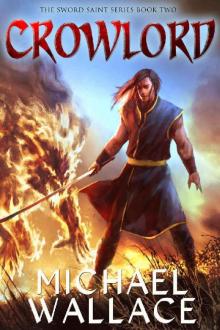 Crowlord (The Sword Saint Series Book 2)
Crowlord (The Sword Saint Series Book 2) Crowlord
Crowlord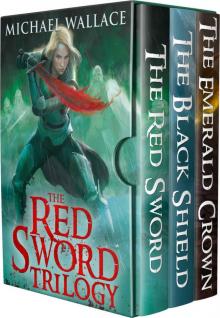 The Red Sword- The Complete Trilogy
The Red Sword- The Complete Trilogy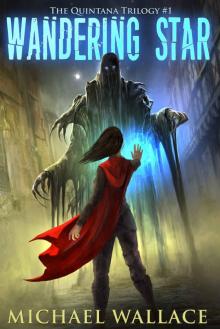 Wandering Star (The Quintana Trilogy Book 1)
Wandering Star (The Quintana Trilogy Book 1)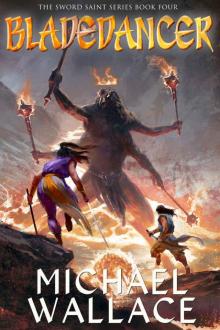 Bladedancer
Bladedancer Sword Saint
Sword Saint The Alliance Trilogy
The Alliance Trilogy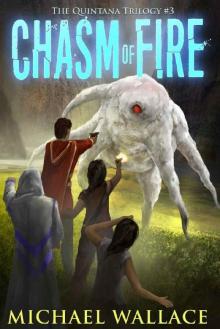 Chasm of Fire
Chasm of Fire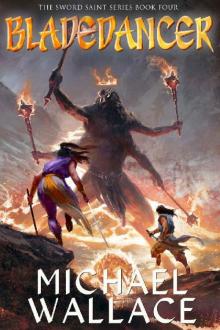 Bladedancer (The Sword Saint Series Book 4)
Bladedancer (The Sword Saint Series Book 4)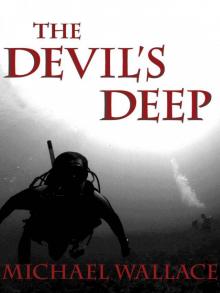 The Devil's Deep
The Devil's Deep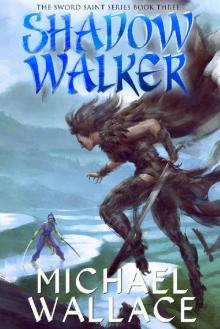 Shadow Walker (The Sword Saint Series Book 3)
Shadow Walker (The Sword Saint Series Book 3)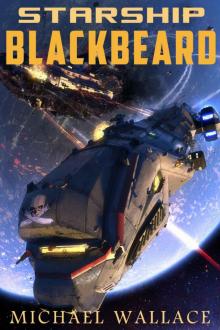 Starship Blackbeard
Starship Blackbeard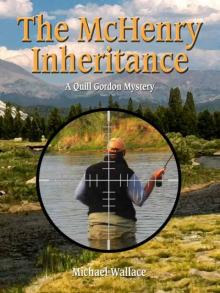 The McHenry Inheritance (Quill Gordon Mystery Book 1)
The McHenry Inheritance (Quill Gordon Mystery Book 1)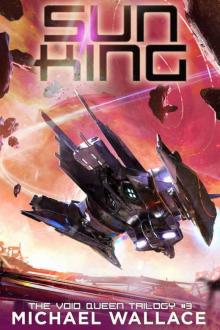 Sun King (The Void Queen Trilogy Book 3)
Sun King (The Void Queen Trilogy Book 3)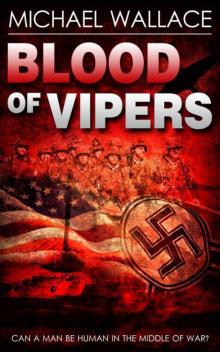 Blood of Vipers
Blood of Vipers Righteous - 01 - The Righteous
Righteous - 01 - The Righteous I Scarce Can Die (Quill Gordon Mystery Book 5)
I Scarce Can Die (Quill Gordon Mystery Book 5)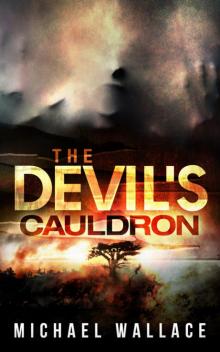 The Devil's Cauldron
The Devil's Cauldron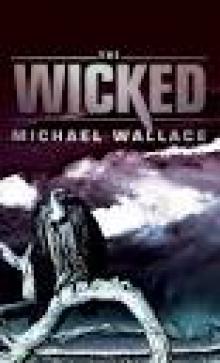 The Wicked (The Righteous)
The Wicked (The Righteous) Crow Hollow
Crow Hollow Righteous03 - The Wicked
Righteous03 - The Wicked Righteous02 - Mighty and Strong
Righteous02 - Mighty and Strong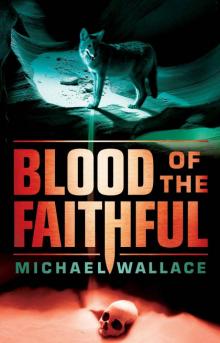 Blood of the Faithful
Blood of the Faithful Wash Her Guilt Away (Quill Gordon Mystery Book 2)
Wash Her Guilt Away (Quill Gordon Mystery Book 2) The Kingdom of the Bears
The Kingdom of the Bears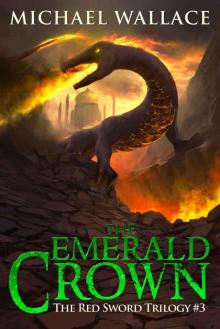 The Emerald Crown (The Red Sword Trilogy Book 3)
The Emerald Crown (The Red Sword Trilogy Book 3)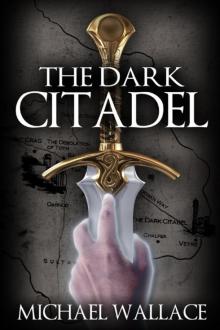 The Dark Citadel
The Dark Citadel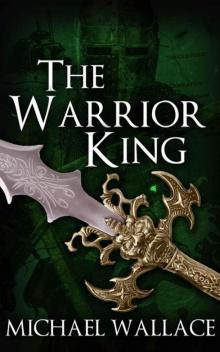 The Warrior King (Book 4)
The Warrior King (Book 4)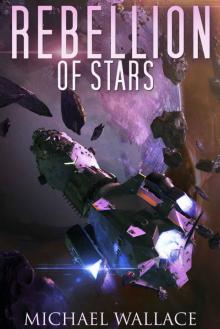 Rebellion of Stars (Starship Blackbeard Book 4)
Rebellion of Stars (Starship Blackbeard Book 4) Righteous04 - The Blessed and the Damned
Righteous04 - The Blessed and the Damned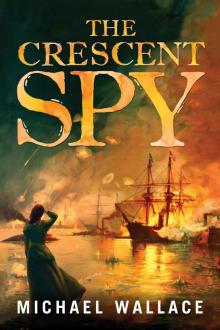 The Crescent Spy
The Crescent Spy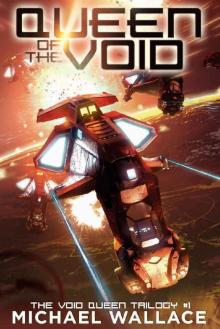 Queen of the Void (The Void Queen Trilogy Book 1)
Queen of the Void (The Void Queen Trilogy Book 1)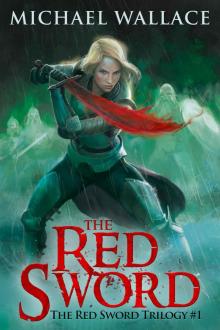 The Red Sword (The Red Sword Trilogy Book 1)
The Red Sword (The Red Sword Trilogy Book 1) The Sentinel (The Sentinel Trilogy Book 1)
The Sentinel (The Sentinel Trilogy Book 1) The Golden Griffin (Book 3)
The Golden Griffin (Book 3) The Blessed and the Damned (Righteous Series #4)
The Blessed and the Damned (Righteous Series #4)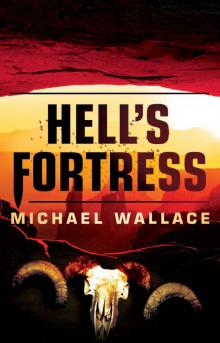 Hell's Fortress
Hell's Fortress Not Death, But Love (Quill Gordon Mystery Book 3)
Not Death, But Love (Quill Gordon Mystery Book 3) Destroying Angel
Destroying Angel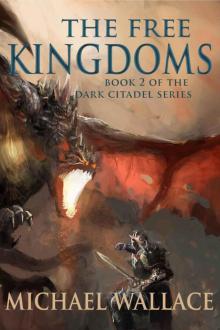 The Free Kingdoms (Book 2)
The Free Kingdoms (Book 2)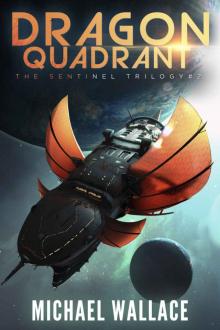 Dragon Quadrant (The Sentinel Trilogy Book 2)
Dragon Quadrant (The Sentinel Trilogy Book 2)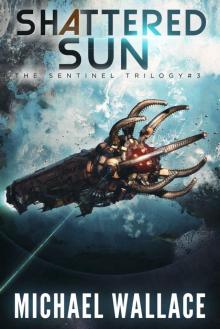 Shattered Sun (The Sentinel Trilogy Book 3)
Shattered Sun (The Sentinel Trilogy Book 3)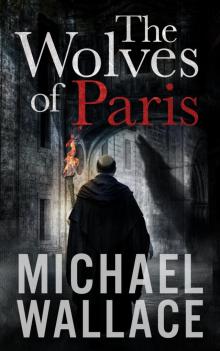 The Wolves of Paris
The Wolves of Paris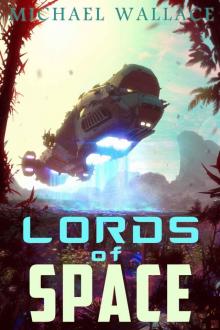 Lords of Space (Starship Blackbeard Book 2)
Lords of Space (Starship Blackbeard Book 2)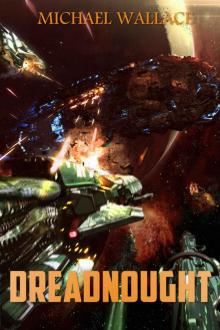 Dreadnought (Starship Blackbeard Book 3)
Dreadnought (Starship Blackbeard Book 3) The Village of Dead Souls: A Zombie Novel
The Village of Dead Souls: A Zombie Novel The Black Shield (The Red Sword Book 2)
The Black Shield (The Red Sword Book 2) The Daughters Of Alta Mira (Quill Gordon Mystery Book 4)
The Daughters Of Alta Mira (Quill Gordon Mystery Book 4) Mighty and Strong (The Righteous)
Mighty and Strong (The Righteous)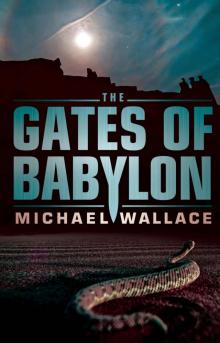 The Gates of Babylon
The Gates of Babylon